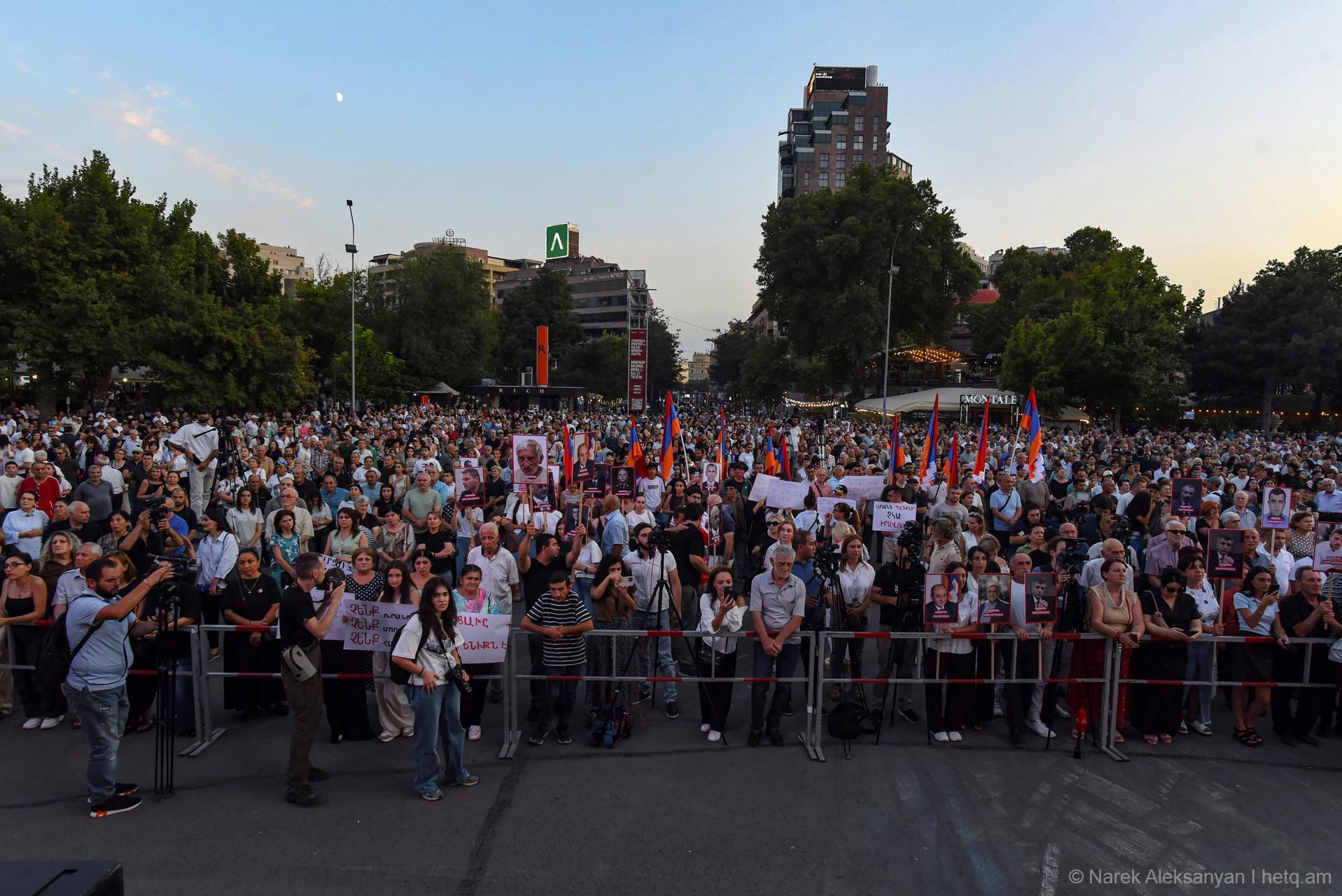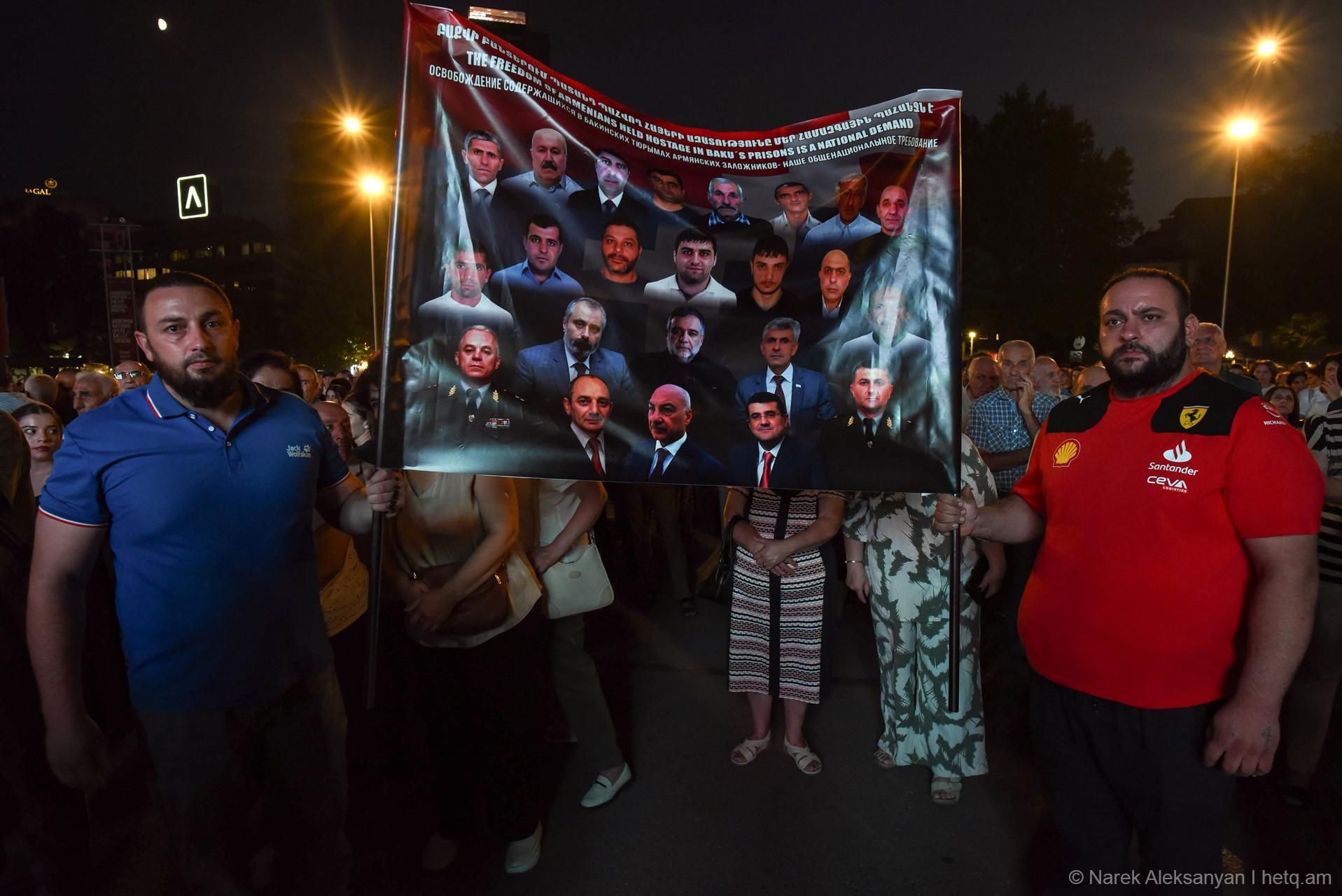
“What Trust?”: Artsakh Refugees and the ‘Trump Route’
The September 2 Yerevan protest showed that trust in the 'Trump Route’ is at an all time low.
By Martha Gathercole
Karina stands alongside her grandson with tears in her eyes at the protest for the rights of Artsakh refugees on September 2 in Yerevan’s Liberty Square.
She shares her grief of being forced to leave everything behind twice in her life: once in 1988, aged 23 as a mother, and again in 2023 at 58 as a grandmother.
She was forced out of Baku, as one of 400,000 Armenians during the 1980s and early 1990s. Massacres of Armenians were carried out by groups of Azerbaijanis, to which both Azerbaijani and Soviet authorities turned a blind eye. She then rebuilt her life in Artsakh, only to be forced out again years later, due to the ethnic cleansing of Artsakh Armenians by Azerbaijan. One of her sons lies in a graveyard in Artsakh, which none of the refugees can now visit. "I've left everything there, I've left my son there,” she says.
On September 2, the people of Artsakh usually celebrate the declaration of Artsakh’s independence. Now, the day is marked with grief.
On Tuesday, Artsakh refugees forced from their homeland stood up to protest for their rights which have been neglected by the Armenian government. The protest seems more reflective and mournful than many, but resolute nevertheless. Shouts of "Artsakh, Artsakh" resound from the audience. Turning round to see their faces, many hold each others’ hands, watch footage of their homeland on a large video screen and listen to emotive speeches from the platform, with tears in their eyes.
“We are here to support our Artsakh,” Artsakh refugee Vladimir tells me. I ask many Artsakh Armenians attending the protest what they want from the government and without hesitation they say that their desire is to return. But, Vladimir explains they need a safety guarantee for this. They can only return “if there are no Turks”, his friend chips in. “Then, ninety percent will say that they're going home.”
Under UN international law, Artsakh refugees do have the de jure ‘right of return’ to their homeland. However, Nikol Pashinyan's government has declared that the issue of Artsakh Armenians’ return is not part of its agenda. Pashinyan has encouraged refugees to settle in Armenia and has declared the Artsakh question ‘closed’.
“The question is not closed: we want to go home to our motherland,” Vladimir tells me.
Despite Pashinyan's advice, settling into life in Yerevan has not been easy for displaced Artsakh Armenians. Many tell of the number of refugees who remain homeless and unemployed almost two years after the displacement.
“There is nowhere to live, finding work is so hard… nothing is left", Karina tells me.
Many mention the pain of being separated from the graves where the sons of these displaced are buried, in Nagorno-Karabakh, as the most painful aspect of life in Yerevan.
“We've buried 5,000 people; this kind of pain is unbearable,” another tells me. Again, the hope of returning to these graves shines through: “There’s still hope. Perhaps we’ll see each other again”, Karina says tearfully.
Lack of trust in the ‘Trump Route’
I ask a woman from Yerevan, showing solidarity at the protest, if she trusts the agreement made between Armenia and Azerbaijan relating to the ‘Trump Route’.
"What trust?”, she responds. “They (Azerbaijanis) are already in Kapan, Jermuk… there won't be any response from them, no document (agreement)”.
The agreement, reached at the White House on August 8 between Armenia and Azerbaijan announcing the 42km route through Armenia’s Syunik Province, will connect Azerbaijan with its exclave Nakhchevan.
This deal has guaranteed that Armenia's sovereignty will be maintained in the region.
Understandably however, faith in a corridor agreement with Azerbaijan among the refugees forced from their homeland by Azerbaijan, remains low.
Hayk, who moved from Artsakh in 2020, and has been studying in the U.S. since, believes that the so-called "Trump Route for International Peace and Prosperity” through Syunik means giving it away as a ‘free gift’ to Azerbaijan. "History shows that you never get those lands back". He cited the loss of Nakhchevan to Azerbaijan in 1921 as an example of this. A story like Karina's hardly shows that Azerbaijani action in southern Armenia will bring ‘peace’ or ‘prosperity’ to Armenians.
Pashinyan was called many things that evening: one word, traitor, was the common denominator.
Moving on from Armenia to Russia
Karina's other son lives in Russia, with his wife and four children. “They could find everything they wanted there.” she told me. They found a job and place to live. It seems that even for an Armenian, it was easier to find a place in society in Russia, than in Armenia. This has been the case for many Artsakh refugees.
Former Republic of Artsakh Human Rights Defender Artak Beglaryan says that approximately 10,000 (out of a total of 100,000) refugees have settled abroad after being forced from their homeland. If Armenia does not look after its own refugees, another country will.
The future remains uncertain for young Artsakh Armenians, who now attend schools across Armenia.
Robert, the father of a schoolboy, tells me how his son misses his former school in Artsakh and the friends he once had.
Karina gestures to her grandson. “I want to reassure him, so that they have hope.” She told me that having this hope is necessary for his survival. I ask what this hope is for.
She says, “To return, to return, to return.”
Photos: Narek Aleksanyan / © Hetq
 Videos
Videos Photos
Photos


Comments (1)
Write a comment